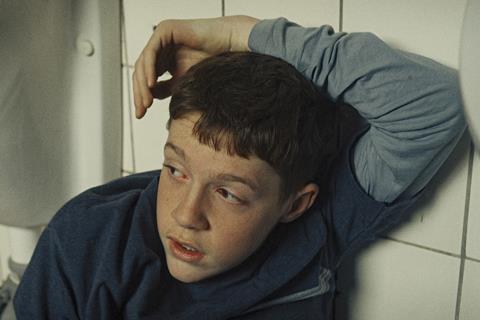Constanze Klaue’s Perspectives title is set in a small East German town post-reunification

Dir/scr: Costanze Klaue. Germany. 2025. 110mins
The ways in which the provinces of former East Germany became, after reunification, seedbeds of xenophobia and right-wing extremism is not exactly a new subject for German cinema. But approaching the theme from the ground up and listening to her characters, writer-director Costanze Klaue makes a case for a fresh tilt at the target in this quietly absorbing feature debut. About families and growing-up as much as it is about radicalisation, Punching The World lets itself get distracted by the minutiae of the life of two brothers in eastern Saxony – and is all the richer for it.
About families and growing-up as much as it is about radicalisation
A fine ensemble cast is just one token of the care that clearly lies behind this empathetic film. Some may feel that people who set fire to buildings earmarked for asylum seekers do not merit attempts to understand them. But Punching The World, which is based on an attention-grabbing 2016 novel by Lukas Rietzschel, is neither a political debate nor an apologia. It’s more of an open dramatic question, one that should interest German audiences when the film is released there after its Berlinale Perspectives premiere. Elsewhere, Klaue’s debut will need critical support to push back against the déjà vu its synopsis might suggest.
Opening in 2006, the action unfolds in a flat, agricultural landscape scarred by the ruins of a socialist dream – the abandoned quarry where 12-year-old Philipp (Anton Franke) and his nine-year old brother Tobi (Camille Moltzen) go swimming; a factory that has become a scary vandalized playground; huge farms going to rack and ruin because there’s no money in milk anymore. There’s human damage too – dad Stefan (Christian Nathe), a recovering alcoholic, is forced to work on construction projects far from home while the neighbours call in Polish contractors from just across the nearby border to fix their plumbing. Mum Sabine (Anja Schneider) is a nurse working long shifts to help pay for the new family house Stefan has been building in his spare time, brick by brick.
That house never will be finished – but the family moves in anyway. Take that as a metaphor if you like; Klaue seems less interested in big allegorical statements than in the lives of two boys who are trying to make sense of the world just as the adults around them are falling apart. The arrival of a ghost from their father’s past – a washed-up electrician called Uwe (Meinhard Neumann), a tragic figure who sucks all the joy out of a room – could be symbolic too, but the whispered conversations and parental unease are real enough when you’re that age. Sometimes it’s Philipp, tasked with being the responsible elder brother, who carries the film’s lilting, nuanced point of view, sometimes it’s Tobi who, for a while feels like the wisest one of the whole lot, the one who will make good. But fate and circumstance can play funny tricks.
It’s ironic that these former East German provinces where the film is set host a small minority Slavic-speaking community – ironic because coexistence is supposed to teach tolerance, but here the effect appears to be the opposite, despite the lip-service paid to bilingualism at the brothers’ school. When Philipp is taken under the wing of one of the cool older guys at that same school, he will discover, in this charismatic proto-Nazi thug’s elision of perceived enemies – Slavs, Muslims, Jews. migrants – that any target will do, as long as it can be branded as ‘not us’.
An edgy soundtrack by musician and producer PC Nacht, at its most striking in a childlike two-note piano melody, underlines the see-saw vision of a world where right and wrong can feel like bourgeois luxuries.
Production company: Flare Film, Chromosom Film
International sales: The Yellow Affair by Newen Connect, contact@theyellowaffair.com
Producers: Alexander Wadouh, Roxana Richters, Gabriele Simon, Martin Heisler
Screenplay: Costanze Klaue, based on the novel by Lukas Rietzschel
Production design: Uli Friedrichs, Michael Schindlmeier
Editing: Emma Alice Graf, Andreas Wodraschke
Cinematography: Florian Bruckner
Music: P C Nackt
Main cast: Anton Franke, Camille Moltzen, Anja Schneider, Christian Nathe, Johannes Scheidweiler, Sammy Scheuritzel, Tilmann Döbler, Moritz Hoyer, Meinhard Neumann, Steffi Kühnert
























